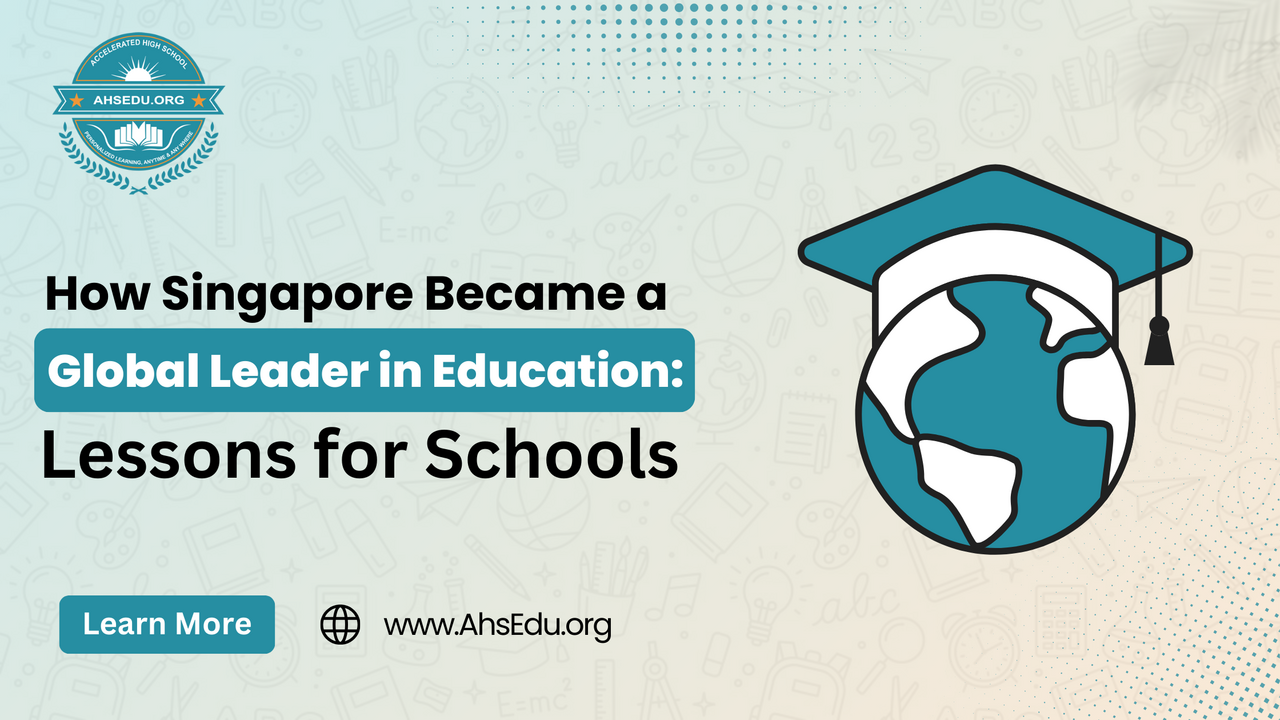Singapore has consistently ranked among the top countries in global education rankings, outperforming many developed nations. The country’s high student performance in international assessments like PISA (Programme for International Student Assessment) is no accident—it is the result of strategic planning, strong policies, and a commitment to quality education. Schools around the world can learn valuable lessons from Singapore’s approach to education. Let’s explore what makes Singapore’s education system so successful and what other schools can adopt from it.
1. A Strong National Education Policy
One of the key reasons for Singapore’s educational success is its well-structured national education policy. The government actively invests in teacher training, curriculum development, and educational technology. There is a clear long-term vision that ensures every student receives a high-quality education, regardless of their background.
Lesson for Schools:
- Establish a clear educational framework with well-defined goals.
- Invest in teacher training and professional development.
- Ensure equal learning opportunities for all students.
2. Highly Trained and Respected Teachers
Singapore believes that the quality of education depends on the quality of teachers. Only the top 5% of graduates are accepted into teacher training programs. Once selected, teachers undergo rigorous training and receive continuous professional development throughout their careers. They are also given career progression opportunities, which keeps them motivated and committed to excellence.
Lesson for Schools:
- Implement strict teacher selection criteria.
- Provide continuous training and mentorship for educators.
- Offer career development pathways to retain skilled teachers.
3. A Balanced and Rigorous Curriculum
Singapore’s education system is known for its balance between core subjects and practical skills. The curriculum focuses on problem-solving, creativity, and critical thinking rather than rote memorization. Subjects like math and science are taught with real-world applications, making learning more engaging and effective.
Lesson for Schools:
- Focus on practical learning and real-world applications.
- Promote critical thinking and creativity over memorization.
- Regularly update the curriculum to meet modern educational needs.
4. Emphasis on Technology and Innovation
Singapore integrates technology in education at all levels. Classrooms are equipped with smartboards, online learning platforms, and AI-powered tools to personalize student learning. The government actively supports STEM (Science, Technology, Engineering, and Mathematics) education, ensuring students are prepared for the digital age.
Lesson for Schools:
- Integrate modern technology in teaching methods.
- Encourage students to explore STEM subjects and digital literacy.
- Provide access to online learning platforms for flexible learning.
5. Personalized and Adaptive Learning
Instead of a one-size-fits-all approach, Singapore tailors education to each student’s abilities and needs. Students who struggle in certain subjects receive special support programs, while advanced learners are given opportunities to accelerate their education. This ensures that no student is left behind.
Lesson for Schools:
- Implement individualized learning plans based on student performance.
- Offer extra support for struggling students and enrichment programs for advanced learners.
- Use adaptive learning technology to track and support student progress.
6. Strong Parental and Community Involvement
Singaporean schools actively involve parents, businesses, and community leaders in the education process. Parents are encouraged to participate in school activities, while businesses provide students with internships and real-world learning experiences. This creates a strong support system for students.
Lesson for Schools:
- Encourage parental involvement in school activities.
- Partner with local businesses and industries for student mentorship.
- Organize extracurricular activities that connect students with the community.
7. A Culture of Lifelong Learning
Education in Singapore does not stop after graduation. The government promotes lifelong learning initiatives to ensure citizens continue developing new skills throughout their lives. Programs like SkillsFuture help adults upskill and stay competitive in the workforce.
Lesson for Schools:
- Encourage students to develop a habit of lifelong learning.
- Teach skills that help students adapt to changing career demands.
- Provide resources for continued education and professional development.
What Schools Can Learn from Singapore
Singapore’s education system proves that quality education requires continuous improvement, innovation, and strong support from all stakeholders. Schools that want to replicate Singapore’s success should focus on: Investing in teacher quality
- Encouraging critical thinking and creativity
- Using technology to enhance learning
- Creating personalized education plans for students
- Engaging parents and communities in the learning process
- Promoting lifelong learning habits
By adopting these principles, schools can create an effective and future-ready education system that prepares students for success in the 21st century.
Empower Your School with Future-Ready Learning – Partner with us at https://ahsedu.org/school-form Today!


